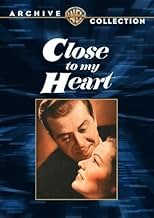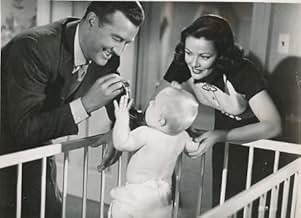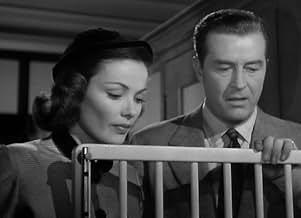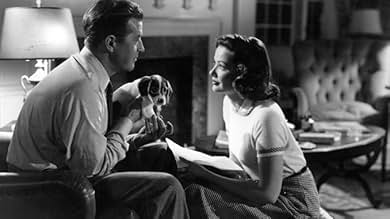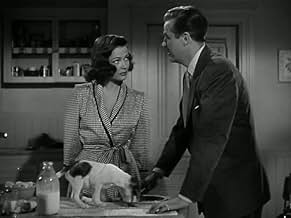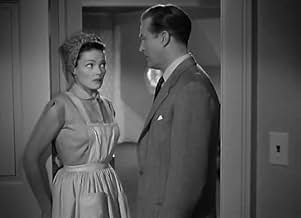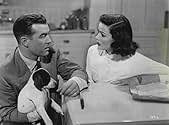Füge eine Handlung in deiner Sprache hinzuA columnist and his wife deal with obstacles when they try to adopt an abandoned baby.A columnist and his wife deal with obstacles when they try to adopt an abandoned baby.A columnist and his wife deal with obstacles when they try to adopt an abandoned baby.
Baby John Winslow
- Baby Danny
- (as Baby John)
John Alvin
- Prospective Adoptive Father
- (Nicht genannt)
Rodney Bell
- Young Parent in Car
- (Nicht genannt)
Nan Boardman
- Woman Patient
- (Nicht genannt)
Ralph Byrd
- Charlie
- (Nicht genannt)
Luther Crockett
- Prison Warden
- (Nicht genannt)
Douglas Hudson Finley
- Baby in other car
- (Nicht genannt)
Elizabeth Flournoy
- Dr. Williams's Receptionist
- (Nicht genannt)
Dick Gordon
- Clothing Store Owner
- (Nicht genannt)
Fred Graham
- Prison Guard
- (Nicht genannt)
Empfohlene Bewertungen
This is a pretty good little film about a couple adopting a baby. It works best when it is looking at the couple at home dealing with the new child, or when they adopt a puppy as a substitute. This is all quite charming and although Gene Tierney is a little cloyingly sweet at times (and I might add ravishingly beautiful), Ray Milland is very good. Where the film is less successful is when it traces Milland's search for the baby's real parents - this all becomes a tad melodramatic. And Fay Bainter's oh-so-well-meaning adoption agency supervisor comes over as so mean and heartless in her treatment of Tierney that the film becomes unbelievable. She tortures the poor woman! Milland's final impassioned monologue to Bainter is impossible for any actor to play but Milland has a good stab at it. Overall very entertaining.
Ray Milland and Gene Tierney star in a near remake of Penny Serenade. They can't have children and explore the avenue of adoption. In the Beulah Bondi role of the agency inspector, Fay Bainter takes over. If you've seen her in Journey for Margaret, you know she can come across as concerned for children very well. This one has a couple of differences, mostly to do with Gene's character versus Irene Dunne's original version. Irene is sweet and deep-feeling, but Gene seems incredibly insincere and impulsive.
Everything out of Ray's mouth is hilarious and witty, adding a refreshing comic element to the story. I happened to agree with his side of the argument about adoption, but unfortunately, Hollywood took Gene's side. She's made out to be a natural mother who can't resist the baby in question, but I didn't believe her for a second. As is the case with many couples who have a great relationship, once child-rearing enters into the mix, fights and incompatibilities float to the surface. Ray and Gene were happy at the start of the movie, but when she becomes obsessed with the idea of adopting this particular baby, it strains their marriage. This movie also tackles the nature vs. Nurture debate that has stumped experts through the ages. If you have a strong opinion one way or the other, you might not like the message of the film. And while it's not as good as the original version, if you like the cast, you might want to give it a shot.
Everything out of Ray's mouth is hilarious and witty, adding a refreshing comic element to the story. I happened to agree with his side of the argument about adoption, but unfortunately, Hollywood took Gene's side. She's made out to be a natural mother who can't resist the baby in question, but I didn't believe her for a second. As is the case with many couples who have a great relationship, once child-rearing enters into the mix, fights and incompatibilities float to the surface. Ray and Gene were happy at the start of the movie, but when she becomes obsessed with the idea of adopting this particular baby, it strains their marriage. This movie also tackles the nature vs. Nurture debate that has stumped experts through the ages. If you have a strong opinion one way or the other, you might not like the message of the film. And while it's not as good as the original version, if you like the cast, you might want to give it a shot.
I remembered this movie from years ago, and somehow I had it stuck in my mind that James Stewart played the husband - it was the kind of role he was good at, especially the emotional closing scenes, but instead it is Ray Milland as journalist Brad Sheridan and Gene Tierney as Midge Sheridan. The opening scene shows a doctor telling Midge that she will never be able to have a child. She takes the news hard, but then she and her husband of four years begin looking for a baby.
They go to an adoption agency - actually Midge does - and is told there is a two year waiting list by the sympathetic head of the agency, Mrs. Morrow (Fay Bainter). But they get a tip about a foundling left at a police station, and Midge goes to visit him. She goes to visit every day at the orphanage, bathes him, cares for him, brings him dolls. Eventually the Sheridans get permission to take him home with them in hopes it will lead to adoption. They name the child "Danny" in the meantime.
Midge doesn't care who his parents are, but Brad is not so sure, especially when he finds out about an adopted boy who became a criminal in spite of being brought up in a good adoptive home. Mrs. Morrow is worried that if Brad finds out his parentage is "bad" that he will never treat Danny like a true blank slate. However, part worry over the possible mental heritage of Danny, part the natural curiosity of a blood-hound reporter has him chasing leads to find out how Danny came to be abandoned and who did the abandoning. What does he find out? Watch and find out.
This really is a sentimental journey, and you have to leave your modern sensibilities on hold to enjoy this little story from 66 years ago. How can a middling journalist afford a house that looks like a bank president's on one salary? Why does Midge go to the doctor to learn of her infertility AND to the adoption agency alone? Why does Midge dress to the nines to clean house and handle the baby? Doesn't Mrs. Morrow have anything better to do than to follow Brad's search for Danny's parents? You are just going to have to forget about these questions.
The acting here is quite good, and Ray Milland shows a side of his acting chops as a normal family man that he seldom got to do over at his home studio of Paramount. As usual, Max Steiner's score sets just the right mood. Do note that not everybody in the 50s agreed with what this film was trying to say about criminology here. For an alternate view watch 1956's "Bad Seed".
They go to an adoption agency - actually Midge does - and is told there is a two year waiting list by the sympathetic head of the agency, Mrs. Morrow (Fay Bainter). But they get a tip about a foundling left at a police station, and Midge goes to visit him. She goes to visit every day at the orphanage, bathes him, cares for him, brings him dolls. Eventually the Sheridans get permission to take him home with them in hopes it will lead to adoption. They name the child "Danny" in the meantime.
Midge doesn't care who his parents are, but Brad is not so sure, especially when he finds out about an adopted boy who became a criminal in spite of being brought up in a good adoptive home. Mrs. Morrow is worried that if Brad finds out his parentage is "bad" that he will never treat Danny like a true blank slate. However, part worry over the possible mental heritage of Danny, part the natural curiosity of a blood-hound reporter has him chasing leads to find out how Danny came to be abandoned and who did the abandoning. What does he find out? Watch and find out.
This really is a sentimental journey, and you have to leave your modern sensibilities on hold to enjoy this little story from 66 years ago. How can a middling journalist afford a house that looks like a bank president's on one salary? Why does Midge go to the doctor to learn of her infertility AND to the adoption agency alone? Why does Midge dress to the nines to clean house and handle the baby? Doesn't Mrs. Morrow have anything better to do than to follow Brad's search for Danny's parents? You are just going to have to forget about these questions.
The acting here is quite good, and Ray Milland shows a side of his acting chops as a normal family man that he seldom got to do over at his home studio of Paramount. As usual, Max Steiner's score sets just the right mood. Do note that not everybody in the 50s agreed with what this film was trying to say about criminology here. For an alternate view watch 1956's "Bad Seed".
I give this movie 10 stars because I appreciate a storyline that promotes adoption!
I think adoption is a beautiful thing and I like that the wife character in this movie wasn't hung up on the idea that she had to give birth to a baby in order to be a mother.
I don't fault the husband character for his investigative work to research the abandoned baby's background; and while his quest for the truth causes friction, I like that it results in marital growth rather than separation.
I recommend this movie for anyone who enjoys the actors (Ray Milland and Gene Tierney) along with a happy ending. Thanks to TCM for airing it!
I think adoption is a beautiful thing and I like that the wife character in this movie wasn't hung up on the idea that she had to give birth to a baby in order to be a mother.
I don't fault the husband character for his investigative work to research the abandoned baby's background; and while his quest for the truth causes friction, I like that it results in marital growth rather than separation.
I recommend this movie for anyone who enjoys the actors (Ray Milland and Gene Tierney) along with a happy ending. Thanks to TCM for airing it!
"Close to My Heart" is not necessarily an easy film to watch. It deals with infertility issues and is a very good film, but it might be very tough for folks struggling with this to watch the movie. Don't say I didn't warn you!
Ray Milland plays Brad Sheridan and Gene Tierney his wife, Midge. After being married for several years, they need to face facts--she is infertile and cannot have a child. She is interested in adopting, though it's obvious Brad isn't thrilled by the idea. He goes along with it but he never seems excited by the prospect.
The wait list for adopting a baby is quite long, but an opportunity arises to POSSIBLY get a baby sooner. Danny was abandoned at a local police station and no one know about his parents. Midge is thrilled to adopt the lovely boy but once again Brad just seems uncertain...mostly because he is worried about the sort of biological parents the child might have. Being a reporter, Brad starts investigating leads...trying, for his own peace of mind, to find out more about the baby. All during this time, the baby is living with the Sheridans and Midge is in love with the little bundle of joy. Brad still has cold feet...and this worries the woman from the adoption agency. She's ready to recommend to the court that the adoption NOT go through due to Brad's apparent ambivalence. What's next in this film? Give it a look and find out for yourself.
I like this film for several reasons. The biggest is that it's unique and I cannot recall ever seeing another film like it (except, in an odd way "Bedtime for Bonzo" with its similar nature versus nurture theme). I also really liked Tierney's acting. She was really convincing and I admired her ability to do such a film considering her history of severe depression and her own issues with having a severely disabled child. I kept wondering how hard all this must have been....but she sure was great and pulled it off well. It is a bit schmaltzy, but I loved it. Overall, a surprisingly good film--one that will grab you and rip at your heart repeatedly. In fact, you might just want to watch this one with some Kleenex nearby.
By the way, if you DO watch it, watch the very final scene...that child's expression is priceless!
Ray Milland plays Brad Sheridan and Gene Tierney his wife, Midge. After being married for several years, they need to face facts--she is infertile and cannot have a child. She is interested in adopting, though it's obvious Brad isn't thrilled by the idea. He goes along with it but he never seems excited by the prospect.
The wait list for adopting a baby is quite long, but an opportunity arises to POSSIBLY get a baby sooner. Danny was abandoned at a local police station and no one know about his parents. Midge is thrilled to adopt the lovely boy but once again Brad just seems uncertain...mostly because he is worried about the sort of biological parents the child might have. Being a reporter, Brad starts investigating leads...trying, for his own peace of mind, to find out more about the baby. All during this time, the baby is living with the Sheridans and Midge is in love with the little bundle of joy. Brad still has cold feet...and this worries the woman from the adoption agency. She's ready to recommend to the court that the adoption NOT go through due to Brad's apparent ambivalence. What's next in this film? Give it a look and find out for yourself.
I like this film for several reasons. The biggest is that it's unique and I cannot recall ever seeing another film like it (except, in an odd way "Bedtime for Bonzo" with its similar nature versus nurture theme). I also really liked Tierney's acting. She was really convincing and I admired her ability to do such a film considering her history of severe depression and her own issues with having a severely disabled child. I kept wondering how hard all this must have been....but she sure was great and pulled it off well. It is a bit schmaltzy, but I loved it. Overall, a surprisingly good film--one that will grab you and rip at your heart repeatedly. In fact, you might just want to watch this one with some Kleenex nearby.
By the way, if you DO watch it, watch the very final scene...that child's expression is priceless!
Wusstest du schon
- WissenswertesThe Sheridans' car is a 1951 Ford Custom Deluxe convertible coupe.
Top-Auswahl
Melde dich zum Bewerten an und greife auf die Watchlist für personalisierte Empfehlungen zu.
Details
- Erscheinungsdatum
- Herkunftsland
- Sprache
- Auch bekannt als
- A Baby for Midge
- Drehorte
- Produktionsfirma
- Weitere beteiligte Unternehmen bei IMDbPro anzeigen
- Laufzeit
- 1 Std. 30 Min.(90 min)
- Farbe
- Seitenverhältnis
- 1.37 : 1
Zu dieser Seite beitragen
Bearbeitung vorschlagen oder fehlenden Inhalt hinzufügen

